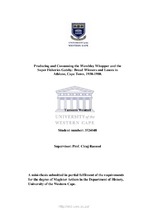| dc.contributor.advisor | Rassool, Ciraj | |
| dc.contributor.author | Wentzel, Tazneem | |
| dc.date.accessioned | 2019-04-17T09:49:20Z | |
| dc.date.available | 2019-04-17T09:49:20Z | |
| dc.date.issued | 2018 | |
| dc.identifier.uri | http://hdl.handle.net/11394/6672 | |
| dc.description | Magister Artium - MA | en_US |
| dc.description.abstract | Wembley Roadhouse and Super Fisheries have cemented themselves as food
institutions on the Cape Flats. Family-owned take-aways establishments that
appeared on the black periphery and catered for the black consumer were
popularised amid the political and economic upheavals of forced removals in the
1970s. The shifting labour market, changing work schedules, and hardening
political climate was reflected in the popularisation and consumption of breadbased
take-aways on the Cape Flats. This research sets out to show how the
production and consumption of the Wembley Whopper and the Super Fisheries
Gatsby constituted cultural signifiers of agency that were historically embedded
within a set of discursive practices and a business ethic that distinguished halal
take-aways from franchised and state subsidised food. Ideas of tradition and
health became categories through which racial discourse was operationalised by
both cultural and scientific agents of the colonial and apartheid state.
Nevertheless, the Whopper and the Gatsby represented fast food culinary
adaptations that appealed to a mobile generation of activists that challenged social
restrictions and ideas about race and diet. | en_US |
| dc.language.iso | en | en_US |
| dc.publisher | University of the Western Cape | en_US |
| dc.subject | Culinary discourse | en_US |
| dc.subject | Tradition | en_US |
| dc.subject | Food History | en_US |
| dc.subject | Take-aways | en_US |
| dc.subject | Immigration | en_US |
| dc.title | Producing and consuming the Wembley Whopper and the Super Fisheries Gatsby: Bread winners and losers in Athlone, Cape Town, 1950-1980. | en_US |
| dc.rights.holder | University of the Western Cape | en_US |

